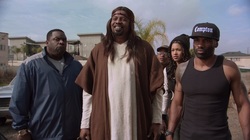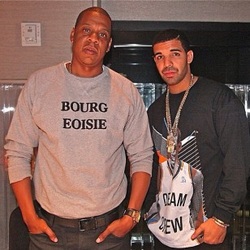
What happens when you combine James Cone’s black liberation theology and Kanye West’s “Jesus Walks”? You end up with Aaron McGruder’s irreverent new show Black Jesus on Adult Swim. From the creator of The Boondocks, McGruder takes the cliché question of “What Would Jesus Do?” and places it in the heart of South Central Los Angeles. The show’s premiere was welcomed with both anticipation and criticism as it has already inspired a change.org petition requesting its cancellation.
Within the first few minutes, Black Jesus decked out in a dusty robe and crown of thorns has already used the n-word, dropped an f-bomb, and is sharing a blunt with his new disciples. Shocking, jarring, and irreverent? Yes. Is it blasphemous? No. The idea of Christ returning to Compton among “the least of these” to use the language of the Gospel of Matthew or James Cone’s notion of God’s co-suffering and experiencing blackness when he stated, “Either God is identified with the oppressed to the point that their experience becomes God's experience, or God is a God of racism,” is within the bounds of Christian tradition (albeit at the very edge of that boundary line). Whether portrayed in the Gospels as a reluctant Galilean rabbi turning water into wine or as South Central’s resident Son of God transforming water into premium cognac Jesus in both cases is relating to the condition of the “least of these”. In just the first episode, the Black messiah is subject to police brutality and by all accounts is an unemployed, homeless, black man.
African American Religious Studies scholars Yolanda Pierce and Juan Thomas-Floyd shared their thoughts with NPR about the theological possibilities raised with by the program. I fully concur that there are important issues and topics that can be addressed by envisioning a returned Black Jesus who is situated in the Black community on multiple levels. It is not simply skin color that makes the show so provocative but how the other characters in the show relate to a returned Black Jesus that should catch our attention. You see people in a depressed economic area react to an incarnation of Jesus in many of the same ways that they do to a heavenly Christ. Residents of Compton want their ‘daily bread’ as Black Jesus is asked for lotto numbers and is requested to serve as the get-away driver for a drug deal. How many times has the name of Jesus been invoked in a convenience store lines as someone plays the lottery or as the gangster kisses his crucifix before engaging in some unsavory activity? The modern incarnation of Black Jesus in these episodes operates as an indictment of our own ways of trying to manipulate divinity to “make a come up.”
McGruder consciously focuses on the human element of Christ nature with his Black Jesus character. The great paradox of the Trinitarian Creed is that Christ is both equally divine and equally human. We tend to downplay this aspect of Christ’s character as it can lead to many unsettling questions. However, for McGruder this means that our very human Black Jesus is prone to cursing, acknowledges a nice looking young lady, and many other mundane human attributes that are ignored in the veneration of Jesus as a divine being. Another subtle attribute of MaGruder’s Black Jesus is his Christological standing regarding being co-equal with God the Father. There are hints that McGruder’s Black Jesus shares a non-Trinitarian (almost Arianist) black folk understanding of Christ’s divinity as being a divine being but not the Supreme Being. All of the language of Black Jesus regarding his “Pops” is subordinate language; this may change in later episodes but was quite noticeable in the first episode.
Aaron McGruder has a noted track record of holding a sobering mirror up to Black America and asking us deep questions about our collective selves. For example in the episode, “Return of the King” from The Boondocks , Martin Luther King, Jr. awaken from a 32 year coma only to find that his memory has been used to justify all forms of debauchery tells a room full of rowdy African Americans “Will you ignorant niggas please shut the hell up?!" There are plenty of opportunities for Black Jesus to challenge American notions of faith and religiosity in a non-judgmental manner and school us on what a 21st century Black messiah struggling to make it in the hood might do? On a final note, however, hopefully Black Jesus will not get bogged down in over-the-top vulgar language and scenarios for the sake of shock value and lose its important function as cultural critique.
Within the first few minutes, Black Jesus decked out in a dusty robe and crown of thorns has already used the n-word, dropped an f-bomb, and is sharing a blunt with his new disciples. Shocking, jarring, and irreverent? Yes. Is it blasphemous? No. The idea of Christ returning to Compton among “the least of these” to use the language of the Gospel of Matthew or James Cone’s notion of God’s co-suffering and experiencing blackness when he stated, “Either God is identified with the oppressed to the point that their experience becomes God's experience, or God is a God of racism,” is within the bounds of Christian tradition (albeit at the very edge of that boundary line). Whether portrayed in the Gospels as a reluctant Galilean rabbi turning water into wine or as South Central’s resident Son of God transforming water into premium cognac Jesus in both cases is relating to the condition of the “least of these”. In just the first episode, the Black messiah is subject to police brutality and by all accounts is an unemployed, homeless, black man.
African American Religious Studies scholars Yolanda Pierce and Juan Thomas-Floyd shared their thoughts with NPR about the theological possibilities raised with by the program. I fully concur that there are important issues and topics that can be addressed by envisioning a returned Black Jesus who is situated in the Black community on multiple levels. It is not simply skin color that makes the show so provocative but how the other characters in the show relate to a returned Black Jesus that should catch our attention. You see people in a depressed economic area react to an incarnation of Jesus in many of the same ways that they do to a heavenly Christ. Residents of Compton want their ‘daily bread’ as Black Jesus is asked for lotto numbers and is requested to serve as the get-away driver for a drug deal. How many times has the name of Jesus been invoked in a convenience store lines as someone plays the lottery or as the gangster kisses his crucifix before engaging in some unsavory activity? The modern incarnation of Black Jesus in these episodes operates as an indictment of our own ways of trying to manipulate divinity to “make a come up.”
McGruder consciously focuses on the human element of Christ nature with his Black Jesus character. The great paradox of the Trinitarian Creed is that Christ is both equally divine and equally human. We tend to downplay this aspect of Christ’s character as it can lead to many unsettling questions. However, for McGruder this means that our very human Black Jesus is prone to cursing, acknowledges a nice looking young lady, and many other mundane human attributes that are ignored in the veneration of Jesus as a divine being. Another subtle attribute of MaGruder’s Black Jesus is his Christological standing regarding being co-equal with God the Father. There are hints that McGruder’s Black Jesus shares a non-Trinitarian (almost Arianist) black folk understanding of Christ’s divinity as being a divine being but not the Supreme Being. All of the language of Black Jesus regarding his “Pops” is subordinate language; this may change in later episodes but was quite noticeable in the first episode.
Aaron McGruder has a noted track record of holding a sobering mirror up to Black America and asking us deep questions about our collective selves. For example in the episode, “Return of the King” from The Boondocks , Martin Luther King, Jr. awaken from a 32 year coma only to find that his memory has been used to justify all forms of debauchery tells a room full of rowdy African Americans “Will you ignorant niggas please shut the hell up?!" There are plenty of opportunities for Black Jesus to challenge American notions of faith and religiosity in a non-judgmental manner and school us on what a 21st century Black messiah struggling to make it in the hood might do? On a final note, however, hopefully Black Jesus will not get bogged down in over-the-top vulgar language and scenarios for the sake of shock value and lose its important function as cultural critique.


 RSS Feed
RSS Feed
